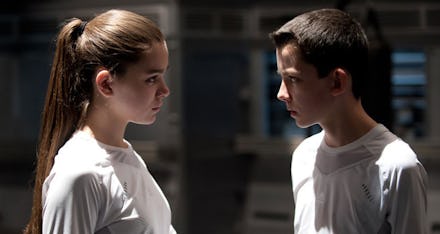'Ender's Game' Series: 5 Sci-Fi Recommendations For 'Ender's Game' Lovers

Next Friday, Orson Scott’s Card classic military sci-fi epic Ender’s Game hits the big screen. Card’s story of children fighting interstellar war has become a classic of the genre. Ender’s Game spawned multiple successful sequels, probably another reason Hollywood’s wiling to give it a try: the possibility of another blockbuster franchise.
For Ender’s Game fans (and Hollywood producers!) looking for other great space sagas, instead of waiting for the next big sci-fi novel to arrive, why not look at some classics from the past? Here are some great series worth looking into:
1. The Foundation Trilogy, by Isaac Asimov
Asimov is considered the greatest science fiction writer of all time by many authors of the genre. In 1965, his Foundation Trilogy beat out The Lord of the Rings to win the Hugo (science fiction) Award for "Best All-Time Series." The Foundation novels are set in a far distant future ruled by a Galactic Empire, where Earth is just a memory to humans now living scattered around the galaxy. The story centers around Hari Seldon, a "psychohistorian" who is able to use scientific laws to predict the future, and sees the end of the Empire coming. Seldon creates a team to put together all of humanity's knowledge in an "Encyclopedia Galactica" before Armageddon … and in the process, give a new hope to saving the galaxy.
2. 'The Hyperion Cantos,' Dan Simmons
If Asimov sounds a bit too heady, you’ll find more of a heartstopper in Dan Simmons’ Hyperion Cantos, a four-book adventure series. It’s the 28th century: Earth is gone, swallowed up in a black hole. Humans are spread across the galaxy, which is at war between The Hegemony, a decadent militaristic society that colonizes other planets, and the Ousters, “interstellar barbarians” trying to avoid their grasp. Between them lies the planet Hyperion, a moon of Jupiter known for a legendary creature called the Shrike, said to grant wishes, travel through time, and kill without mercy when warranted. Most of the galaxy fears the Shrike, but a few are on a quest to meet it face to face …
3. 'The Hammer's Slammers' series, David Drake
If you’re more interested in the military sci-fi element of Ender’s Game, try the Hammer’s Slammers series for some great pulp sci-fi. David Drake’s series follows the work of a mercenary tank regiment in the future, led by one Colonel Alois Hammer. Drake borrows plots from popular mythology for many of the stories, including parts of the Odyssey and Jason and the Argonauts, along with pulp era detective novels.
4. The Uplift Saga, David Brin
Ender’s Game’s plot is a rather provocative one: children being put into war. If you’re a fan of the more provocative sci-fi concepts, try David Brin’s award-winning Uplift Saga. Brin’s world is inspired by stories like the Planet of the Apes novels and the Island of Dr. Moreau. In the Uplift universe, an intergalactic civilization called the Five Galaxies has survived for millions of years through biological uplift, in which a “patron” species genetically modifies lower-level “client” species until they become “sapient,” possessing human levels of intelligence and communication. In Brin’s novels, humans, “the original patrons,” have since become a minor species in a universe of thousands of other races. The stories follow interstellar voyages featuring humans, “neo-chimpanzees”, “neo-dolphins” and even “neo-dogs!” With the wonders of motion capture technology today, I could totally see Hollywood producing these…
5. 'The Forever War,' Joe Haldeman
I can’t talk about military science fiction without mentioning Joe Haldeman’s The Forever War, one of the most acclaimed sci-fi novels of all time. Haldeman’s story focuses on humans drafted to fight in the ongoing interstellar war between Earth and a far distant species. But with their travels through space, comes the effect of time dilation: a two-year space expedition for the crew means decades of time gone on Earth, and soldiers return to a home planet they no longer recognize. Haldeman was writing from the perspective of having fought in Vietnam, and many have called The Forever War the best anti-war sci-fi novel ever written. The book won the Hugo, Nebula, and Locus Awards for best science fiction novel, and spawned three successful sequels.
These are just a small sampling of some of lesser-known greats: I haven’t even mentioned the Ringworld series from Larry Niven, Ursula K. Le Guin’s Hainish novels, Arthur C. Clarke’s lesser-known Rama stories, or any of the lesser known space operas of Robert A. Heinlein. All these authors have given us visions of the future that remain as thrilling and provocative now as when originally written, stories as eye-opening for their ideas as for their action. We hope you enjoy discovering them.